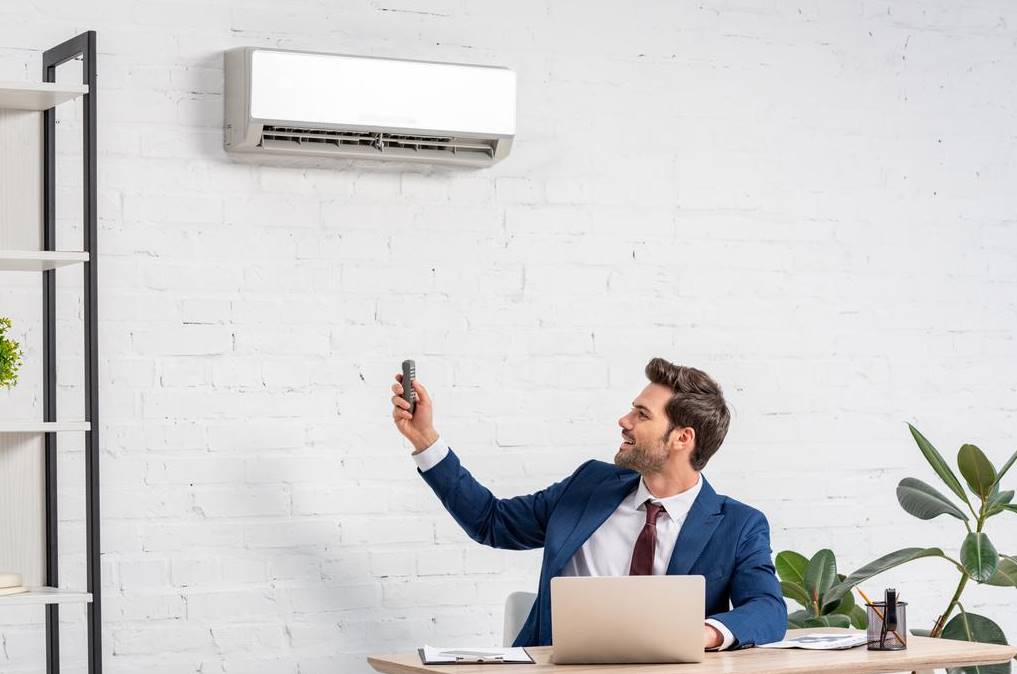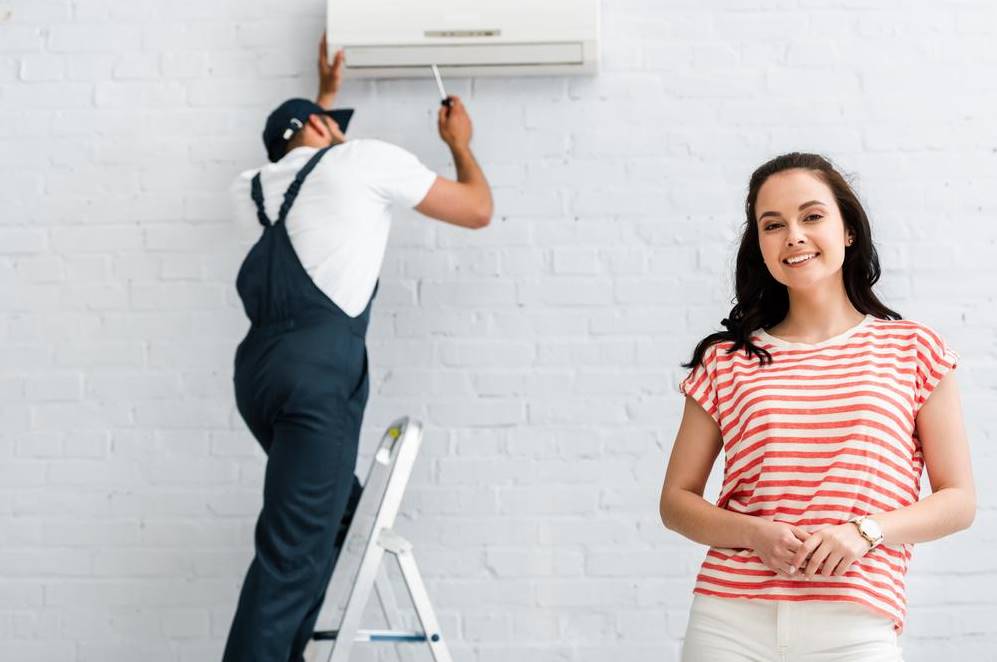In a world where interior comfort is crucial, air conditioning is essential. Did you realise that air conditioning has other uses besides merely making the hot summer months bearable? It's crucial for indoor air quality to ensure our breathing space is pleasant and safe for us to be in. This article will examine how air conditioning systems improve the air we breathe and the health benefits of doing so.
Function Of Air Conditioners
The role of air conditioning in the effort to improve indoor air quality should be more appreciated. It accomplishes this by a confluence of numerous crucial mechanisms, each contributing significantly to developing a more conducive environment for health.
Air conditioning is now a staple in almost every home. However, many people who own homes have other concerns besides maintaining a comfortable temperature. Since it is common knowledge that numerous airborne contaminants can wreak havoc on a family's health and comfort, many individuals want to enhance indoor air quality.
Is it true that air conditioning enhances the quality of indoor air? (Pause for dramatic effect) It depends. Generally, the air in your home will not be filtered or cleaned by a regular air conditioner. An air conditioner's primary function is to 'condition' the air, which means removing heat from the air inside the home.
The Basics Of Air Quality
Let's understand what "air quality" is before we explore how AC enhances air quality. The term "air quality" describes the state of the air around you. It includes pollution, allergies, humidity, and general comfort.
What Is Indoor Air Pollution?
Before discussing how AC improves air quality, let's define indoor air pollution and why it's a problem. In general, the term "indoor air pollution" describes a wide range of potentially harmful air pollutants found inside buildings. Vulnerable populations, such as the elderly or small children, may experience more severe symptoms, including respiratory issues, headaches, and more, due to this pollution. Pollen, dust, and pet dander are common airborne pollutants.
Why Is Air Quality Important?
The air quality in our homes and workplaces can impact our comfort and productivity and our immediate and long-term health. Poor IAQ can cause headaches, weariness, lack of attention, and eye, nose, throat, and lung irritation. Asthma and allergy symptoms may become more severe. Furthermore, indoor toxins and conditions can contribute to developing diseases like cancer, stroke, and diabetes. Asthma, which is worse by a wet indoor atmosphere, is just one example.
Can The Quality Of Air Inside Buildings Be Enhanced?
Improving indoor air quality relies heavily on ventilation and airflow. This can be accomplished simply by allowing outside air in through open windows and doors. As a result, temperature, pollution, and humidity can be managed. Removing the source of the moisture, mould, or pollution is another option for bettering air quality.
IAQ can be maintained with the help of a mechanical HVAC system, although this is only sometimes the case.
What Are The Advantages Of An Air Conditioner?
Purification And Filtration
Filtration and purification are two of the key ways in which air conditioning improves air quality. Air conditioner filters trap dust, pollen, and pet dander. These filters remove common allergens and other pollutants from the indoor air.
Humidity Control
Humidity needs to be kept at a healthy level for optimal comfort and health. Mould growth is facilitated by high humidity, while dry skin and respiratory issues are brought on by low humidity. Humidity levels can be controlled by air conditioning systems, maintaining a safe and healthy environment for humans.
Clean Breathability And Cooling
Stale air can be avoided by ensuring adequate airflow. There is a steady flow of clean, filtered air thanks to the air conditioning system's ability to circulate and ventilate the indoor environment.
A properly functioning air conditioning system will circulate and ventilate the indoor air, minimising the accumulation of pollutants and guaranteeing a consistent supply of clean, filtered air.
The outside air's quality is another consideration when assessing IAQ. The air quality within your home will increase if it is properly aired. An easy and inexpensive way to increase the air quality inside your home is to open the windows and doors. When external temperatures are mild, this is a great option for getting some air circulation without substantially altering the internal climate.
Energy-Efficient Systems
Energy efficiency is improving in today's air conditioning systems, which is great news for your wallet and the planet. Less electricity is needed to improve air quality with energy-efficient technologies.
Upkeep And Cleaning Of Ducts
Regular air conditioner maintenance ensures indoor air quality improves. Keeping your system in good working order requires regular maintenance, including filter changes, duct cleanings, and inspections by trained technicians.
Not cleaning your air ducts regularly can cause dust and other particles to build up in your air conditioner. This means that these pollutants can be recycled into your dwelling. A professional duct cleaning service may be something you want to look into.
The Common Misconception
There are a few common misunderstandings regarding HVAC systems and air quality. Some individuals, for instance, think that constantly running the air conditioner is the most efficient way to keep the air quality high, even though doing so wastes a lot of energy. The key is to strike a balance.
On a steamy summer day, everyone can agree that turning on the air conditioning is a welcome relief. However, an air conditioner's functionality extends beyond making indoor temperatures more bearable. One of the less obvious benefits of air conditioners is that they help to improve air quality.
The Cost Of Comfort
Quality air conditioning systems may appear expensive, but the long-term health benefits make them worth it.
Preserving Air Conditioners For High-Quality Indoor Air
Due to the influence of HVAC systems on indoor air quality, keeping the HVAC system in good working order is the first step towards sustaining healthy indoor air. The system's performance will deteriorate over time if used in isolation. If you do this, the system is more likely to move the offending particles around instead of filtering the air effectively.
Regular Service For The Ac System
With regular maintenance, an HVAC system will be able to maintain air quality satisfactorily. It could not even turn on. Air conditioning systems rely heavily on regular maintenance to ensure their continued operation. Failure to do routine maintenance can cause issues with a system to manifest and intensify over time. Because of this, the whole system may crash.
Preventive care is also useful. As a result, the system can conserve energy without sacrificing performance. Energy bills are reduced as a result. Maintaining your air conditioner consistently is something that must be addressed. You can begin the ball rolling by scheduling an appointment online with most HVAC firms.
Routine Maintenance
The ducts and vents of HVAC systems can collect dust, debris, and allergies. Because of this, the HVAC system may be to blame for distributing harmful pollutants throughout the house. Cleaning regularly is the best way to repair this damage. If you take the time to clean the system thoroughly, you can eliminate contamination and stop it from recirculating.
The bright side is that most reputable HVAC maintenance businesses also provide cleaning services. If you want to ensure that your air conditioner lasts for many years to come, you may do two things at once.
Modifying Preferences
The filter in your air conditioner stops contaminants from entering the system. They will eventually have to stop, though. Filters cannot improve indoor air quality when clogged with pollutants.
When this occurs, it's time to swap out the AC unit's filter. In most cases, all that needs to be done is to replace the old filter with a new one. Most filters have dimensions and types printed on the side so that they can be easily replaced. The identical data is also included in the HVAC system's user guide if they don't.
Problems with the complete HVAC system can arise if filters aren't changed regularly. The system's airflow will be reduced if the filter is clogged with dirt and debris. This will reduce the system's effectiveness and increase its cost.
Is It True That Air Conditioning Enhances The Quality Of Indoor Air?
This is a complex question to answer, as you can see. To be sure, air conditioning does assist in improving air quality, but it's important to keep in mind that it may only do so to the extent desired if the air conditioner in question has been outfitted with a filtration system. In addition to ventilation, changing the air filter in your HVAC system is crucial for maintaining a healthy indoor environment.
In our pursuit of ease, let us recognize how air conditioning can improve our lives. It protects the quality of the air we breathe inside, making our homes safer and more comfortable without drawing attention to itself. When you turn on your air conditioner for some much-needed R&R, keep in mind that it's doing more than just keeping you cool; it's also providing your lungs with healthier air to breathe.
Air conditioning is more than simply keeping cool; it's also about breathing easily. By learning how AC enhances air quality, we can better manage the conditions inside our homes and offices. Incorporating air conditioning into our designs makes for more pleasurable environments and healthier ones.
Should I Have A Professional Take Care Of My Ac Repairs?
Due to the complicated nature of air conditioning systems, regular maintenance from a licenced air conditioning expert is required to keep the unit running and reap the full benefits of air cooling.
People with respiratory conditions like asthma and allergies are particularly vulnerable to the effects of a poorly maintained air conditioning system. This is because contaminants and allergens like dust and pollen can be circulated rather than eliminated. Wetness is another issue that might arise; it can cause mould and mildew to grow. If there is a leak of refrigerants or other chemicals, it can produce poisonous vapours.
An HVAC repair engineer may be necessary if your air conditioner is complex or large. Professional HVAC technicians should be consulted to test and maintain air conditioning systems in larger buildings and workplaces with multiple units.
How Often Should I Have My Air Conditioner's Filters Changed?
Depending on the type of filter and the amount of use, it is advised that they be changed every three to six months.
Did you know that your air conditioner has a filter that can help eliminate dust and other particles floating in the air? You can keep dust, grime, and other airborne particles from reentering your home thanks to this filter installed in your HVAC system. In this sense, a well-maintained HVAC system with a fresh air filter can do wonders for the quality of air you breathe at home.
The air filter in your air conditioner should be changed annually as part of the routine maintenance performed on your HVAC system. Depending on how often you use the filter, it is advised that you replace it every 90 days.
Conclusion
Air conditioning improves indoor air quality by making people feel safer and more comfortable. Indoor air pollution from pollen, dust, and pet dander can cause respiratory problems and headaches. Poor indoor air quality can cause asthma, allergies, and diabetes.
Open windows and doors allow outside air to circulate, improving indoor air quality. Mechanical HVAC can also maintain IAQ. Purification and filtering, humidity management, clean breathing and chilling, energy-efficient systems, and duct maintenance are air conditioner benefits.
A well functioning air conditioning system circulates and ventilates the inside environment, reducing pollution and providing clean, filtered air. In milder weather, opening windows and doors increases air circulation without changing the indoor climate. Energy-efficient technologies reduce electricity use, improving air quality.
Air conditioners can recirculate dust and other particles into the home if air ducts are not cleaned regularly. A professional duct cleaning service may be needed to maintain the system.
Common misunderstandings about air conditioning systems and air quality include the idea that running the air conditioner always is the most efficient way to maintain air quality. The goal is to establish a balance. Air conditioning systems can improve indoor air quality and health by focusing on these factors.
Air conditioning systems prevent contaminants from spreading, ensuring high-quality indoor air. Maintenance is necessary to prevent system crashes and maintain system operation. Preventive care saves energy without sacrificing performance, lowering energy expenses.
A regular duct and vent cleaning can eliminate dust, dirt, and allergies, preventing dangerous pollutants from travelling throughout the house. Most HVAC repair companies clean systems to prolong their lifespan.
Changing your air conditioner filter is essential for indoor air quality. Filters only improve indoor air quality when blocked with contaminants. If the filter is blocked, the HVAC system may malfunction, limiting airflow and increasing expenditures.
Air conditioning makes homes safer and more comfortable by improving indoor air quality. While air conditioning keeps you cool, it also improves lung health.
Air conditioning systems are sophisticated and require professional maintenance from a licenced expert. Poorly maintained air conditioning systems can harm asthmatics and allergy sufferers. Larger buildings and multi-unit workplaces need professional HVAC specialists.
Air conditioner air filters should be replaced every three to six months, depending on kind and usage.
Content Summary
- For indoor comfort, air conditioning is needed.
- Indoor air quality can also benefit from using an air conditioner.
- There are a number of features within air conditioners that work together to enhance the quality of indoor air.
- The primary function of a typical air conditioner is to eliminate the heat.
- The term "air quality" refers to a wide range of conditions, including those related to pollution, allergens, humidity, and ease of breathing.
- Several types of toxic contaminants contribute to unhealthy indoor air.
- Diseases and other health problems are directly linked to inadequate indoor air quality.
- Better air quality can be achieved by proper ventilation and air circulation.
- Indoor air quality can be maintained with the use of a mechanical HVAC system.
- Dust, pollen, and pet dander are all filtered out by air conditioners.
- Maintaining a comfortable and healthy relative humidity inside is essential.
- Air conditioners not only keep rooms cool, but also produce air that is safe to breathe.
- When working as intended, air conditioners help to both cool and ventilate a building's interior.
- If you want better air quality indoors, open some windows and doors.
- Low-energy cooling systems are more environmentally friendly.
- It's crucial to perform routine maintenance including filter swaps and duct cleaning.
- Pollutants can be recirculated if air ducts aren't cleaned regularly.
- Ducts and vents in HVAC systems are prone to collecting dust and other debris.
- Air quality and ventilation efficiency depend on regular filter changes.
- With the correct filtration, air conditioning can actually improve the quality of the air within.
- Long-term use of a high-quality air conditioner is beneficial to health.
- For safe and comfortable indoor air, HVAC system maintenance is a must.
- It is suggested that HVAC units be serviced and cleaned regularly.
- Pollutants can be removed from the HVAC system with regular duct cleaning.
- The efficiency and expense of HVAC systems might be diminished by filters that are dirty.
- A filter's lifespan is proportional to its usage and type.
- Changing your air conditioner's filters once a year is an important aspect of maintaining a healthy HVAC system and keeping your home's air clean.
- Every 90 days, you should change out your filter.
Frequently Asked Questions About Air Condition
Air conditioning systems improve indoor air quality by filtering out pollutants like dust, pollen, and pet dander, controlling humidity levels, and providing continuous circulation of clean, filtered air.
Good indoor air quality can improve health, including reduced risks of respiratory issues, allergies, headaches, and eye, nose, and throat irritation. It can also decrease the risk of long-term health conditions like cancer, stroke, and diabetes.
The frequency of air filter changes depends on factors like filter type and usage. In general, changing the air filter every 90 days is recommended. However, some filters may require more frequent replacement, especially in homes with pets or allergies.
Yes, you can improve indoor air quality without an air conditioning system by ensuring proper ventilation through open windows and doors, minimising sources of pollution, and using standalone air purifiers or humidifiers.
Professional HVAC maintenance is essential because it includes tasks like cleaning ducts, inspecting the system, and ensuring that it operates efficiently. Neglecting maintenance can lead to the recirculation of pollutants and reduced air quality. Professional technicians can also identify and address potential issues that may affect indoor air quality.



